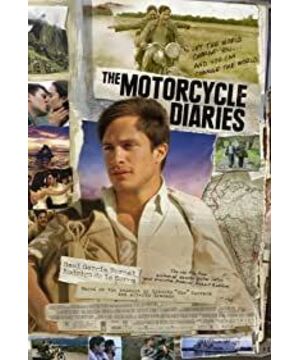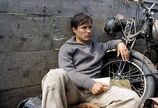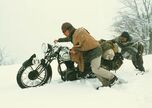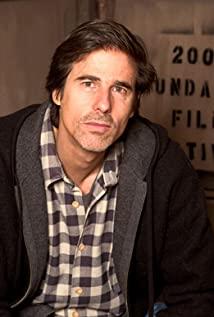Before the end credits of "Motorcycle Diary" appeared, I didn't know that the protagonist in the film was Che Guevara, who was twenty-three or four years old. I downloaded this film after reading an introduction to Latin American films in a magazine. If the second half of the film hadn't cut into a narrative that leaned toward revolution, I might have been impatient to finish what seems to be a road landscape film. But the view of Argentina and Chile in the first half is also one of the reasons why I can't stop.
It wasn't until the hero turned into Guevara that the whole film showed its brilliance. On the other hand, since the film was adapted from the memoirs of Guevara's comrades-in-arms, while the film entered the consumption field, it also carried the task of disseminating Latin American Spanish literature to the world using audio and video as a medium. As a Latin American whose native language is Spanish, especially as a Latin American who has read the memoir, you may not feel the glory of the film. Moreover, the natural scenery of the southern hemisphere and the ruins of the Inca culture are very important to the educated people on this continent. It's not unusual for people. As a result, the attitude of the non-Latin American world to this film is similar to that of Zhang Yimou's "Hero" in Europe and the United States. But in comparison, the amount of information conveyed by the latter is still insignificant. Not to mention that the amorous information of the realistic style brings a sense of intimacy to the audience in the consumer-oriented world, not to mention that "Motorcycle Diary" also contains the heroic personal history of an ideological idol. On the second point, Zhang Yimou is understandable, because the ideology of the mainland is a kind of rouge smeared on the pale and dead skin. If the funeral parlor makeup artist is a sacred worker essential to funeral ceremonies, his work may be nobler and more sophisticated than the mainland's poor ideological control.
Didn't know he was Che Guevara, so when the film described the transformation of the male lead, it was especially interesting to my ignorant audience. Every time the male protagonist is moved by the injustice in the world, I will sigh along with it. Unpredictable, if I already knew him as Guevara, I would still be able to enter the situation set in the film. If I had known him beforehand, I would have thought in the second half: since he is Guevara, it is not surprising that he was cynical in his youth; I would even suspect that such a young Guevara was a memoirist and a filmmaker complicity and co-construction. Again, I have to say that I was lucky not to know the background of the film. All I saw were two sloppy doctors traveling around South America to celebrate one's thirtieth birthday in Venezuela. On the way, they spoofed, won sympathy, and did not forget to ask flowers and willows; the two attacked each other and played pranks, which almost made the vacation plan aborted. After hitting a blind cow, the motorcycle died, and the two stepped into the desert north of Chile. This desert, and the mines in the desert, is where the non-dancing medical student, obsessed with buying a pair of American panties for his Argentine girlfriend, started growing his beard, and when he grew a beard, it would have been on his t-shirt. The character looks alike.
The eyes of an encounter communist make the hero fire his first shot against injustice: he threw a stone hard against the door of a mining truck.
"Look, this is the wall built by the Incas, and the other is the wall built by the Spaniards. This side is called the 'Inca Wall', and that side, we all call it the 'Wall of Fools'." Peru, the male protagonist saw the funding Before their doctors, they were silent. He was angry at the mines, he was candid when the doctor said goodbye, and in between these two events, he also walked slowly in the sea of clouds of the Inca, the sea of clouds, oh no, the clouds. Each cloud contains the wisdom of the Incas. This kind of wisdom allows the hero to soak up the ancient religious blessings of Cusco, to lie on the bricks of Machu Picchu that have endured thousands of years of vicissitudes, and say something like:
"No, you are wrong. Revolutions need guns."
Even if you're not Guevara, just follow him through the deserts and Andes on the Chilean border and you'll be transformed. What about on the Amazon River? From the stern of the festive cruise ship, staring at the towed canoe full of poor people, can you still have the heart to discuss with the prostitutes on the cruise ship how to masturbate through the genitals of fish? The director did not object to anything. He made the actor's 30-year-old teammates the opposite and let the audience choose for themselves: If you were in Latin America in the 1950s, what would you do?
At the end of the film, the opposite disappears almost out of sight again, as in the first half. The doctors and nuns didn't seem to have any contempt for the lepers, they wanted to heal the sick, they wanted to care for the sick. However, a pair of gloves mercilessly exposed the fear of "sick people" as some kind of authoritative doctors and nuns. Of course, more important is the separation of the Amazon River.
"Has anyone swam before?"
"No. I've been here for more than a year, and no one has ever swum."
After that, the film turned to the plot of the hero crossing the river. If the audience still doesn't know that the male protagonist is Guevara at this time, then this plot must be very abrupt. Personally, I don't think the previous narrative set up is enough for the hero to do something amazing at this point. In fact, the film has already begun to uplift the actor during his birthday speech. A speech and a river crossing, which seem to be deliberately performed for Guevara admirers, as if to say: Look, although Guevara is not a hero on the road, he still behaves very well in the end. A hero, that's what a hero should be.
Before that grand speech, the hero was still clumsy and young, similar to all the dance scenes in the film. But after blowing the candle, he is no longer a human being. The director was eager to say these things at the end of the film, eager to let Guevara grow up, and as a result, the seedlings were fueled, but they failed at the end.
Then again, how can a person's specific performance be inferred by common sense? Guevara's psychological maturity, I am afraid that it is difficult to complete the narration alone. Even if the film is 120 minutes long, it has to end in haste, but after all, it also wrote a memorable chapter for Guevara's construction. I mean, Guevara might have been ready to swim the moment he stared at the canoe on the cruise, but unfortunately he had an asthma attack.
View more about The Motorcycle Diaries reviews









